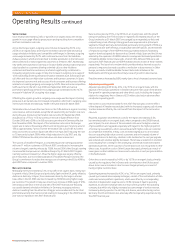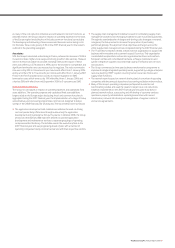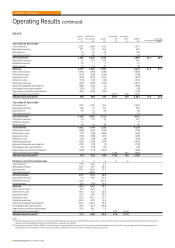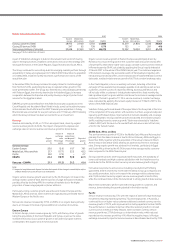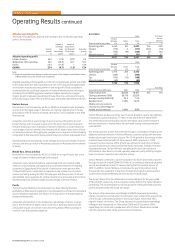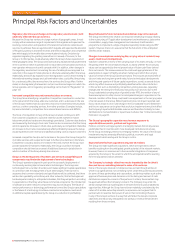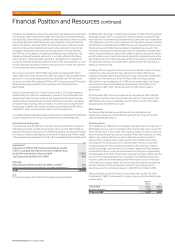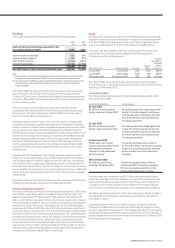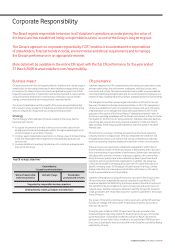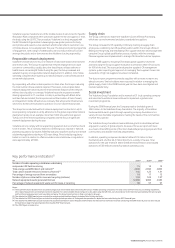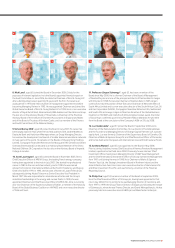Vodafone 2008 Annual Report Download - page 55
Download and view the complete annual report
Please find page 55 of the 2008 Vodafone annual report below. You can navigate through the pages in the report by either clicking on the pages listed below, or by using the keyword search tool below to find specific information within the annual report.
Expected benefits from investment in networks, licences and new
technology may not be realised.
The Group has made substantial investments in the acquisition of licences and in
its mobile networks, including the roll out of 3G networks. The Group expects to
continue to make significant investments in its mobile networks due to increased
usage and the need to offer new services and greater functionality afforded by
new or evolving telecommunications technologies. Accordingly, the rate of the
Group’s capital expenditures in future years could remain high or exceed that
which it has experienced to date.
There can be no assurance that the introduction of new services will proceed
according to anticipated schedules or that the level of demand for new services
will justify the cost of setting up and providing new services. Failure or a delay in
the completion of networks and the launch of new services, or increases in the
associated costs, could have a material adverse effect on the Group’s operations.
The Group may experience a decline in revenue or profitability
notwithstanding its efforts to increase revenue from the introduction
of new services.
As part of its strategy, the Group will continue to offer new services to its existing
customers and seek to increase non-voice service revenue as a percentage of
total service revenue. However, the Group may not be able to introduce these
new services commercially, or may experience significant delays due to problems
such as the availability of new mobile handsets, higher than anticipated prices
of new handsets or availability of new content services. In addition, even if these
services are introduced in accordance with expected time schedules, there is
no assurance that revenue from such services will increase ARPU or maintain
profit margins.
The Group’s business and its ability to retain customers and attract new
customers may be impaired by actual or perceived health risks associated
with the transmission of radio waves from mobile telephones,
transmitters and associated equipment.
Concerns have been expressed in some countries where the Group operates that
the electromagnetic signals emitted by mobile telephone handsets and base
stations may pose health risks at exposure levels below existing guideline levels
and may interfere with the operation of electronic equipment. In addition, as
described under the heading “Legal proceedings” in note 32 to the Consolidated
Financial Statements, several mobile industry participants, including the Company
and Verizon Wireless, have had lawsuits filed against them alleging various
health consequences as a result of mobile phone usage, including brain cancer.
While the Company is not aware that such health risks have been substantiated,
there can be no assurance that the actual, or perceived, risks associated with radio
wave transmission will not impair its ability to retain customers and attract new
customers, reduce mobile telecommunications usage or result in further litigation.
In such event, because of the Group’s strategic focus on mobile telecommunications,
its business and results of operations may be more adversely affected than those
of other companies in the telecommunications sector.
The Group’s business would be adversely affected by the non-supply of
equipment and support services by a major supplier.
Companies within the Group source network infrastructure and other equipment,
as well as network-related and other significant support services, from third party
suppliers. The withdrawal or removal from the market of one or more of these
major third party suppliers would adversely affect the Group’s operations and
could result in additional capital or operational expenditures by the Group.
Vodafone Group Plc Annual Report 2008 53





